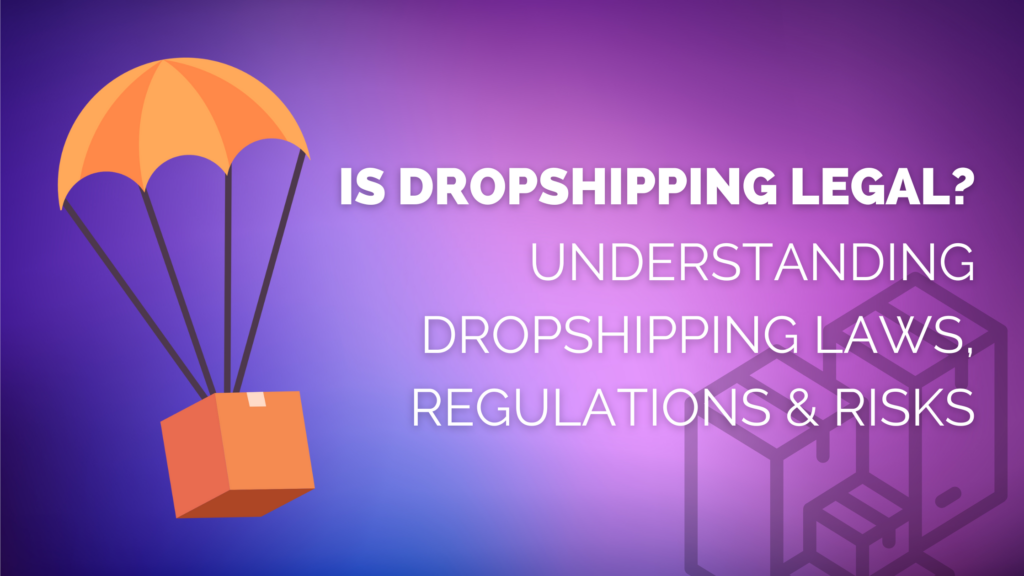Is Dropshipping Legal? Understanding Dropshipping Laws, Regulations and Risks
Dropshipping has gained significant popularity as a cost-effective and low-risk business model for ecommerce entrepreneurs. However, before diving into the world of dropshipping, it’s essential to understand the legal considerations and compliance requirements to ensure a smooth and lawful operation.In this blog, we will understand the legal landscape for dropshipping businesses, covering licensing, taxes, intellectual property, and other laws that dropshippers must comply with. Let’s dive in and clarify the question, “Is dropshipping legal?”
What is Dropshipping?
Dropshipping is a retail fulfillment method in which the seller doesn’t keep the products in stock. Instead, when a store sells a product, it purchases the item from a third-party supplier who then ships it directly to the customer. This eliminates the need for the seller to handle inventory, manage storage space, or fulfill orders. Dropshipping allows entrepreneurs to start an online business with minimal upfront costs and focus on marketing and customer acquisition. Following this, we will understand the legal aspects of dropshipping.
Licensing and Permits for Dropshipping Businesses
When starting a dropshipping business, it’s crucial to ensure compliance with licensing and permit requirements. The specific licenses and permits needed may vary depending on your location and the nature of your business. Here are some common licenses and permits to consider:
Business License
Most jurisdictions require entrepreneurs to obtain a general business license to operate legally. This license ensures that your business complies with local regulations, zoning laws, and other requirements. Contact your local government or visit their website to understand the specific licensing requirements for your dropshipping business.
Sales Tax Permit
If your jurisdiction imposes sales tax on retail goods, you will likely need to obtain a sales tax permit. This permit allows you to collect and remit sales tax on behalf of the government. Sales tax requirements vary from state to state, so it’s essential to familiarize yourself with the regulations in your jurisdiction.
Import and Export Licenses
If you plan to engage in international trade and import products from foreign suppliers or export goods to customers in other countries, you may need to obtain import and export licenses. These licenses ensure compliance with customs regulations and trade laws and facilitate the smooth flow of goods across borders.
Specialized Permits
Depending on the nature of your dropshipping business, you may require specialized permits or certifications. For example, if you sell products related to health and wellness, you may need approval from regulatory bodies such as the Food and Drug Administration (FDA) or the Consumer Product Safety Commission (CPSC). Research the specific requirements for your industry to ensure compliance.
Tax Obligations for Dropshippers
As a dropshipper, you are responsible for fulfilling your tax obligations. Here are some key tax considerations for dropshipping businesses:
Sales Tax
Collecting and remitting sales tax is a crucial requirement for dropshippers. The sales tax rate and regulations vary by jurisdiction, so it’s essential to research and understand the specific requirements applicable to your business. Utilize sales tax automation tools or consult with a tax professional to ensure accurate sales tax collection and reporting.
Income Tax
As a business owner, you are also responsible for reporting and paying income tax on your profits. Keep detailed records of your business expenses and consult with a tax professional to ensure proper income tax reporting.
International Tax Considerations
If you engage in international trade and sell products to customers in other countries, you may have additional tax obligations. Research the tax laws of the countries you operate in to understand any VAT (value-added tax) or GST (goods and services tax) requirements.
Intellectual Property Considerations
Protecting intellectual property is crucial for dropshipping businesses. Here are some key considerations to ensure compliance:
Trademarks
When selecting products to sell, it’s essential to avoid infringing on trademarks. Conduct thorough research to ensure that the products you sell or the branding you use do not violate any existing trademarks. Trademark infringement can lead to legal disputes and damage your business’s reputation.
Copyrights
Respect copyrights by avoiding the sale of counterfeit or pirated products. Ensure that the suppliers you work with are reputable and legitimate. If you design your own products, consider registering copyrights to protect your intellectual property.
Patents
If you plan to sell patented products, ensure that you have the necessary permissions and licenses from the patent holders. Selling patented products without authorization can result in legal consequences and damage to your business’s reputation.
Consumer Protection Laws for Dropshipping Businesses
Dropshippers must comply with consumer protection laws to ensure fair and transparent business practices. Here are some key considerations:
Product Quality and Safety
As a dropshipper, you are responsible for ensuring that the products you sell are safe and of acceptable quality. Partner with reputable suppliers who adhere to quality control standards. If you receive customer complaints about product defects or safety issues, address them promptly and take appropriate action.
Accurate Product Descriptions and Advertising
Avoid misleading or deceptive product descriptions and advertising. Provide accurate and detailed information about the products you sell to avoid customer dissatisfaction and potential legal issues. Be transparent about product specifications, features, and any limitations or restrictions.
Warranty and Return Policies
Clearly communicate your warranty and return policies to customers. Ensure that your policies comply with applicable laws and regulations, including any requirements for refund or replacement options. Promptly address customer inquiries and complaints regarding warranties or returns to maintain customer satisfaction.
Shipping and Fulfillment Regulations
Dropshippers must navigate shipping and fulfillment regulations to ensure efficient and compliant order processing. Consider the following:
Shipping Restrictions
Research shipping restrictions and regulations for the products you sell, particularly if you operate internationally. Some products may be subject to specific shipping restrictions or require additional documentation.
Customs and Import Duties
When shipping products internationally, be aware of customs regulations and import duties. Familiarize yourself with the customs requirements of the countries you ship to and provide accurate and complete customs documentation to facilitate smooth customs clearance.
Delivery Times and Customer Expectations
Set realistic delivery times and manage customer expectations effectively. Communicate clearly about shipping times, potential delays, and any additional fees or charges customers may incur.
International Trade Laws for Dropshipping Businesses
If you engage in international trade, it’s crucial to understand and comply with international trade laws. Consider the following:
Import and Export Regulations
Research import and export regulations for the countries you operate in. Familiarize yourself with customs requirements, trade agreements, and any restrictions or licensing requirements that may apply to your products.
Trade Compliance Programs
Consider implementing trade compliance programs to ensure adherence to international trade laws. These programs help mitigate the risk of non-compliance and facilitate efficient cross-border trade.
Product Safety and Liability
Dropshippers must prioritize product safety and understand their liability in case of product defects or injuries. Consider the following:
Supplier Due Diligence
Conduct thorough due diligence when selecting suppliers. Ensure that they comply with safety standards and have appropriate quality control processes in place. Regularly assess your suppliers’ compliance to mitigate product safety risks.
Product Liability Insurance
Consider obtaining product liability insurance to protect your business from potential legal claims in case of product defects or injuries. Consult with an insurance professional to determine the appropriate coverage for your dropshipping business.
Legal Compliance Checklist for Dropshipping Businesses
To ensure comprehensive legal compliance, use the following checklist:
- Obtain the necessary licenses and permits for your dropshipping business.
- Collect and remit sales tax as required by your jurisdiction.
- Respect trademarks, copyrights, and patents when selecting products to sell.
- Comply with consumer protection laws, ensuring product quality, accurate advertising, and transparent policies.
- Adhere to advertising and marketing regulations, including truth in advertising and privacy laws.
- Understand shipping and fulfillment regulations, including shipping restrictions and customs requirements.
- Comply with international trade laws and regulations when engaging in cross-border trade.
- Prioritize product safety and consider obtaining product liability insurance.
- Establish effective procedures for handling customer disputes and returns.
By following this legal compliance checklist, you can operate your dropshipping business with confidence and ensure a lawful and successful operation.
In conclusion, dropshipping is a legal and legitimate business model, but it’s essential to understand and comply with the relevant laws and regulations. By familiarizing yourself with licensing requirements, tax obligations, intellectual property considerations, consumer protection laws, and other legal aspects, you can build a compliant and thriving dropshipping business. Remember to consult with legal professionals and stay updated on changes in regulations to ensure ongoing compliance. Start your dropshipping journey today, knowing that you are equipped with the knowledge to navigate the legal landscape successfully.





